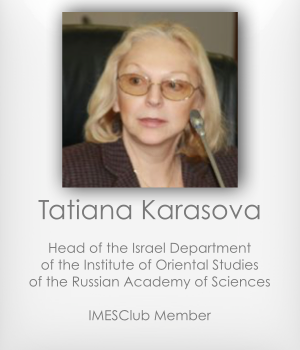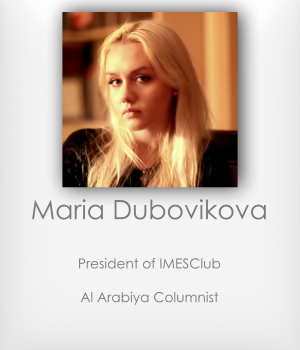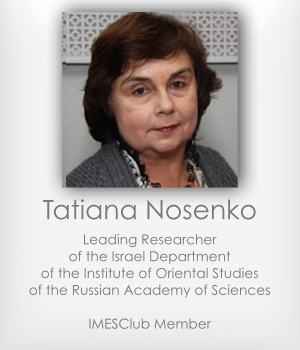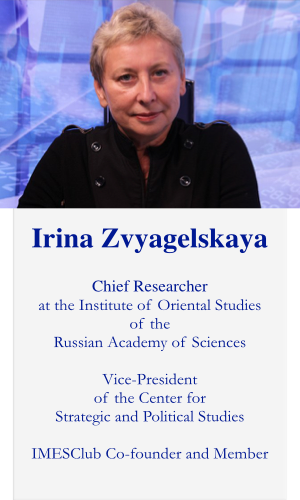"The Israeli people will demand the new government to pay attention to social and economic issues."
 Though the elections results are not final yet, one can be sure that the ruling party Likud once again has reaffirmed its positions with a small advantage, and that is why now Benjamin Netanyahu is starting the process of coalition creation. In order to create a coalition he has to gain 61% of 120 members of Knesset. It is only possible in case of Netanyahu's success in attracting so called right-centrist parties. Two parties will probably become the decisive force – Yisrael Beiteinu, which has got six deputy seats, and Kulanu with 10 seats. If he manages to attract them, the qualified majority will be reached and he will be able to present a new government to the Israeli President. As far as the public opinion over the elections is concerned, first of all, the opposition block has also gained many votes, so not everybody in Israel is ready to vote only for the program of Benjamin Netanyahu which is mainly focused on the security of Israel, many Israelis are more interested in solution of social and economic issues, and that is why they will demand the new government to pay attention right to these issues. So, that is the current situation, I believe it will remain the same and it means that the Middle Eastern policy of Israel will not change. It is possible to predict that the relations with the US will be rather tense as the personal relations between the Israeli Prime Minister and the US president are difficult enough.
Though the elections results are not final yet, one can be sure that the ruling party Likud once again has reaffirmed its positions with a small advantage, and that is why now Benjamin Netanyahu is starting the process of coalition creation. In order to create a coalition he has to gain 61% of 120 members of Knesset. It is only possible in case of Netanyahu's success in attracting so called right-centrist parties. Two parties will probably become the decisive force – Yisrael Beiteinu, which has got six deputy seats, and Kulanu with 10 seats. If he manages to attract them, the qualified majority will be reached and he will be able to present a new government to the Israeli President. As far as the public opinion over the elections is concerned, first of all, the opposition block has also gained many votes, so not everybody in Israel is ready to vote only for the program of Benjamin Netanyahu which is mainly focused on the security of Israel, many Israelis are more interested in solution of social and economic issues, and that is why they will demand the new government to pay attention right to these issues. So, that is the current situation, I believe it will remain the same and it means that the Middle Eastern policy of Israel will not change. It is possible to predict that the relations with the US will be rather tense as the personal relations between the Israeli Prime Minister and the US president are difficult enough.
<...> Not everybody in Israel is ready to vote only for the program of Benjamin Netanyahu which is mainly focused on the security of Israel, many Israelis are more interested in solution of social and economic issues, and that is why they will demand the new government to pay attention right to these issues. <...>
– Tatiana Karasova
As far as the Israeli-Palestinian conflict is concerned, it is not very correct to say that Netanyahu has declared that the two state solution is impossible, as it was widely shared by the media. During the previous elections Netanyahu’s political program included the possibility of creation of an independent Palestinian state. However, it should be admitted, that it contained such preconditions from the Israeli part that it was completely unacceptable for the Palestinian administration. Secondly, I do not think that the new Israeli government is interested in the conflict escalation. I believe, the most important thing for Netanyahu now is to secure the status quo – no peace, no war, just slow negotiations, etc. And it is quite obvious. Though, as I have already mentioned, the increasing pressure from the US is expected, as well as relaunch of the negotiations. But we have been through this. The Israeli government will agree to the negotiations knowing they will be fruitless, as both parties cannot make their positions closer. In case of changes from the Palestinian side, some development may be expected. But as we do not expect important changes from the Israeli side, the Palestinians are unlikely to make such steps either.
Will Israeli election results be a game-changer?
 Netanyahu’s speech to U.S. Congress on Iran caused a stir among experts who are anxiously following the election campaign in Israel as it enters its final stage. Israeli society decides who will rule the country for the next four years and which political course will be chosen. This affects not only the life of ordinary Israelis, but also the fate of the region. Despite its small size and limited capacities, Israel influences the international agenda and is at the center of several complex relations between states. This becomes especially remarkable when one realizes Israel stands between tree major powers in the world arena: Russia, the U.S. and Iran.
Netanyahu’s speech to U.S. Congress on Iran caused a stir among experts who are anxiously following the election campaign in Israel as it enters its final stage. Israeli society decides who will rule the country for the next four years and which political course will be chosen. This affects not only the life of ordinary Israelis, but also the fate of the region. Despite its small size and limited capacities, Israel influences the international agenda and is at the center of several complex relations between states. This becomes especially remarkable when one realizes Israel stands between tree major powers in the world arena: Russia, the U.S. and Iran.
Russia has strong and stable relations with Israel and Israel is among the rare countries which were absent from the U.N. General Assembly vote not to recognize Crimea’s new status. At the same time, Israel considers Iran one of its greatest enemies, while Iran has softened its rhetoric regarding Israel since the step down of Ahmadinejad. Iran still does regard Israel as the troublemaker of the Middle East, however.
Meanwhile Russia has stable relations with the Iranian government and intensifies its ties with Iran against the background of cold Russia-West relations. However, the Iranian youth is much more favorable towards the U.S. than towards Russia. The U.S. supports Israel, but hardly tolerates Netanyahu’s policy. The U.S. clashes with Russia but cooperates with it in the framework of six-party talks on the Iranian nuclear program.
To read the whole article go to Al Arabiya.
"Netanyahu’s declarations are not a piece of breaking news"
 The recent Netanyahu’s declaration about the impossibility of the two-state solution of the Israeli-Palestinian conflict in current conditions is not a piece of breaking news for those who have been monitoring the situation for certain amount of time. It was clear long ago that Netanyahu’s position is to delay and impede such solution by any means. The recent talks brokered by Secretary of State John Kerry that took place from January to April of the last year have clearly shown that the Israeli Prime Minister did not like much the situation when Israel was required to make big territorial concessions and liquidate a part of the settlements. It was considered as unacceptable. And generally, all the proposals of the US side were in fact rejected. Of course the Israeli part is not the only one to blame for the failure of these talks, Palestinians have also done much to bring them to the impasse. But in this case we are speaking about Netanyahu and his recent comment. Why did he need to openly declare his unwillingness to accept this principle? The matter is that the elections are coming in Israel and Netanyahu is in rather difficult situation. So-called left-centrist forces have created a unitied block – it is the Israeli Labor Party and the party of Tzipi Livni. They have united into a so-called Zionist camp – this is a joint voting list with two leaders – Isaac Herzog from the Israeli Labor Party and Tzipi Livni on the first two slots. And this list goes head to head with Likud according to all the polls, i.e. the last two months showed that Likud does not have any leading positions compared to the so-called left-centrists. And of course Netanyahu has to take steps in such situation in order to attract more votes. Particularly, of course, the votes of right electorate and those who have not decided yet, are at stake. And now, as the idea of creation of the Palestinian state is generally extremely unpopular in the Israeli society, Netanyahu uses this issue to somehow gain additional votes. I believe that the steps taken in his speech on the Iranian nuclear program in the US Congress, that unleashed a massive public outcry in the world and are still highly commented on, are also connected with the situation over the elections. Netanyahu’s main trump card is the international policy – he positions himself as Mr. Security and he can profit much from such issues to overrun his opponents during the elections campaign. That is why the declaration was made now. Moreover, just recently a big article by a well-known Israeli journalist Nahum Barnea was published in the Israeli newspaper Yedioth Aharonoth , telling that during the afore-mentioned negotiations of the last year Israel was supposedly offered a number of solutions by the US administration that included the return to the lines of 1967, the solution of Jerusalem problem by partition and, of course, the creation of the Palestinian state, dismantling of some settlements on the territories. And, allegedly, this document has arrived at the Premier’s office and even received a positive assessment. So there was such an article compromising Netanyahu, and now he and his team have to clean themselves by all the possible means from suspicions to be ready to make such colossal concessions. Though, this is to some extent a disinformation, aimed to compromise Netanyahu once again and show that generally he does not deserve the support of the right-nationalist forces that he enjoys now. So this situation has made him finally dot all the i’s and ultimately declare his positions.
The recent Netanyahu’s declaration about the impossibility of the two-state solution of the Israeli-Palestinian conflict in current conditions is not a piece of breaking news for those who have been monitoring the situation for certain amount of time. It was clear long ago that Netanyahu’s position is to delay and impede such solution by any means. The recent talks brokered by Secretary of State John Kerry that took place from January to April of the last year have clearly shown that the Israeli Prime Minister did not like much the situation when Israel was required to make big territorial concessions and liquidate a part of the settlements. It was considered as unacceptable. And generally, all the proposals of the US side were in fact rejected. Of course the Israeli part is not the only one to blame for the failure of these talks, Palestinians have also done much to bring them to the impasse. But in this case we are speaking about Netanyahu and his recent comment. Why did he need to openly declare his unwillingness to accept this principle? The matter is that the elections are coming in Israel and Netanyahu is in rather difficult situation. So-called left-centrist forces have created a unitied block – it is the Israeli Labor Party and the party of Tzipi Livni. They have united into a so-called Zionist camp – this is a joint voting list with two leaders – Isaac Herzog from the Israeli Labor Party and Tzipi Livni on the first two slots. And this list goes head to head with Likud according to all the polls, i.e. the last two months showed that Likud does not have any leading positions compared to the so-called left-centrists. And of course Netanyahu has to take steps in such situation in order to attract more votes. Particularly, of course, the votes of right electorate and those who have not decided yet, are at stake. And now, as the idea of creation of the Palestinian state is generally extremely unpopular in the Israeli society, Netanyahu uses this issue to somehow gain additional votes. I believe that the steps taken in his speech on the Iranian nuclear program in the US Congress, that unleashed a massive public outcry in the world and are still highly commented on, are also connected with the situation over the elections. Netanyahu’s main trump card is the international policy – he positions himself as Mr. Security and he can profit much from such issues to overrun his opponents during the elections campaign. That is why the declaration was made now. Moreover, just recently a big article by a well-known Israeli journalist Nahum Barnea was published in the Israeli newspaper Yedioth Aharonoth , telling that during the afore-mentioned negotiations of the last year Israel was supposedly offered a number of solutions by the US administration that included the return to the lines of 1967, the solution of Jerusalem problem by partition and, of course, the creation of the Palestinian state, dismantling of some settlements on the territories. And, allegedly, this document has arrived at the Premier’s office and even received a positive assessment. So there was such an article compromising Netanyahu, and now he and his team have to clean themselves by all the possible means from suspicions to be ready to make such colossal concessions. Though, this is to some extent a disinformation, aimed to compromise Netanyahu once again and show that generally he does not deserve the support of the right-nationalist forces that he enjoys now. So this situation has made him finally dot all the i’s and ultimately declare his positions.
Выборы в Израиле: что может означать политическое равновесие?

Предвыборная кампания в Израиле по мере приближения дня голосования (17 марта 2015 г.) привлекает к себе все больше внимания. Нынешние выборы являются очередными внеочередными выборами. За 20 месяцев пребывания у власти правительство, включившее в себя разные политические партии при доминировании Ликуда и правых в целом, пережило непростое время. Война в Газе, разногласия по вопросу бюджета, попытка провести проект закона о еврейском характере государства, и наконец выдвинутые недавно обвинения в коррупции против Нетаньяху и его жены в комплексе будут оказывать влияние на предстоящий выбор избирателя. Наряду с этими факторами существуют достаточно устойчивые политические тренды, которые скорее "работают" на правых. Однако центристко-левый блок также стал набирать очки, фактически сравнявшись с Ликудом.
В настоящее время правый блок Ликуд во главе с Биньямином Нетаньяху и его оппонент блок "Сионистский лагерь", возглавляемый Ицхаком Герцогом и Ципи Ливни получают, в соответствии с предварительными оценками, почти равное число голосов. Так, согласно опросу общественного мнения, проведенному газетой "Гаарец" в начале февраля 2015 г., Ликуду прочат 25 мест в Кнессете, лишь на два места больше, чем "Сионистскому лагерю". Столько незначительный разрыв среди основных претендентов свидетельствует о том, что в конечном итоге в ходе голосования чаша весов может качнуться в любую сторону. Главный вопрос будет заключаться в том, у кого в случае победы будет больше шансов создать коалицию.
Многое будет зависеть от того, насколько центристам и левым удастся расширить свою поддержку за счет привлечения части правых избирателей - название их блока ("Сионистский лагерь") явно нацелено на более идеологизированную израильскую аудиторию. Неожиданно объявив о досрочных выборах, Нетаньяху намеренно поставил своих политических противников перед необходимостью действовать быстро с целью перехватить политическую инициативу. И здесь проблемы есть и у левых и у правых. Дело в том, что программы обоих блоков выглядят скорее параллельными, чем конкурирующими. Так, левые делают больший акцент на социальные вопросы, что, безусловно важно для избирателя, но в плане безопасности его надежды традиционно связаны с Ликудом. Евреи в Израиле четко разделяют два понятия - безопасность государства и личная безопасность. Если безопасность государства укрепилась в условиях развала и дестабилизации в арабском мире, то проблема личной безопасности становится более острой из-за роста терроризма. Для еврейского населения Израиля характерен когнитивный диссонанс, который непосредственно влияет на политический выбор избирателя. С одной стороны, Израиль - самое сильное и эффективное в военном отношении государство на Ближнем Востоке. С другой стороны, жизни евреев по-прежнему находятся под угрозой, причем не только на Ближнем Востоке, но даже в спокойной и безопасной Европе. Отсюда происходит и удивительное совпадение оценок избирателями успешности предыдущего правительства и их же уверенностью вновь увидеть на посту премьер-министра Нетаньяху. В конце января 65 % опрошенных были недовольны политикой Нетаньяху на посту премьера. И они же заявили, что скорее всего он вновь станет премьером. При этом только 30% опрошенных действительно хотят видеть его в кресле премьера. Это, конечно, немного, но у Ицхака Герцога шансов занять этот пост еще меньше - лишь 11 % считают его подходящим кандидатом.
Таким образом центристам и левым, если они хотят увеличить свое представительство, необходимо, наряду с социально-экономической повесткой дня, сделать больший акцент на урегулировании палестинской проблемы, на неких новых идеях расширения сотрудничества в сфере безопасности с рядом арабских государств, прежде всего, с Египтом и Иорданией. Центристско-левая коалиция могла бы, как считают ее сторонники, выступить за возобновление переговоров с палестинцами, замораживание поселений, диалог с арабскими государствами на основе арабской инициативы, за поиск решений для сектора Газы вместе с Египтом и Иорданией. Когда речь заходит о безопасности, и правые и левые говорят об одном и том же -- исламском терроризме, Иране и прочем, но методы у них разные. Например, левые говорят, что проблему Ирана надо решать вместе с США, а для того, чтобы вместе с арабами бороться против ИГ и других экстремистов, надо решать проблему палестинцев. Для правых оккупация фактически сакральна. И они будут делать все, чтобы сохранить поселения, а значит и военное присутствие.
Что же представляет собой ныне израильское общество, к которому обращаются ведущие политические силы? Прежде всего, оно остается фрагментированным. По мнению израильских исследователей, существует и все больше обостряется конфликт двух народов внутри еврейского населения Израиля. Происходит постоянное увеличение численности ортодоксов и ультраортодоксов (харедим). Являясь выходцами из бедных необразованных слоев из небольших городков, они очень консервативны. Для них предпочтительно, чтобы вся жизнь в Израиле регламентировалась религиозными установками. Представители образованного класса, жители крупных городов составляют в Израиле общество постмодерна. Эти две части еврейского народа имеют разные приоритеты, взгляды и представления. Для ортодоксов мирный процесс не важен и не нужен, и они остаются резервом для правых и религиозных партий, причем демографический фактор явно на их стороне.
Наконец, резервом для правых остается и значительная часть израильских граждан, иммигрировавших из бывшего СССР. Они выступают за сильное государство, за решительность и жесткость, что в их глазах ассоциируется с правыми. Тем более, что в отношении социализма у них осталось своего рода генетическое отторжение.
Свою роль играет и активность избирателя на выборах. В целом для Израиля характерна высокая явка, но распределяется она неравномерно. Среди харедим и религиозных евреев она составляет 95%, у поселенцев - 85%, а среди городской части населения не превышает 70%. Соответственно, у правых больше шансов.
И все же учитывая то, что ныне оба блока претендуют на практически равное число голосов, возникает вопрос о перспективах формирования жизнеспособного правительства. В случае победы и Ликуд и "Сионистский лагерь" получат возможность создания правительств узкой коалиции, т.е. либо правое узкое правительство, либо узкое центристко-левое. Такие правительство малоустойчивы, им трудно проводить через Кнессет важные решения. Кроме того, создавая узкую коалицию, Нетаньяху столкнется и с политическими соперниками, прежде всего, с Авигдором Либерманом, лидером партии НДИ (Наш дом Израиль) и Моше Кахлоном, покинувшем ряды Ликуда и создавшем в ноябре 2014 года свою партию Кулану (Мы все). При создании узкой коалиции торг с ними может оказаться очень нелегким.
Для Герцога и Ливни будущая узкая коалиция означает, что правительство может оказаться еще более шатким и уязвимым, чем правое. Не ясно, смогут ли они вообще создать такую коалицию или после неудачных попыток им, в соответствии с израильским законодательством, придется передать это право Ликуду.
Не исключено, что решением для обоих блоков могло бы стать правительство широкой коалиции. Как полагают некоторые израильские наблюдатели, Нетаньяху не всегда был успешным премьером, но он может быть надежным партнером. Наконец, правительство широкой коалиции на базе обоих блоков поможет отсечь самых непримиримых ультраправых, что в целом отвечало бы национальным интересам Израиля.
Источник: МГИМО Университет
#Tunisiavote 2014, its results and what do they mean.
 I suppose there are several interesting aspects of the elections in Tunisia that took place last Sunday and the results of which are already known.
I suppose there are several interesting aspects of the elections in Tunisia that took place last Sunday and the results of which are already known.
The first aspect to be mentioned concerns the turnout. The electoral body in Tunisia is over 8 million people and a bit more than 5 million were registered as voters. This is 900 thousand more than in 2011 and, from my opinion, that witnesses the growth of the election committee’s (ISIE) professionalism, which did a great job this summer. At the same time the declared turnout of 61,8%, which is often praised as a very high, in reality includes only registered electors and is about 3 million people. In 2011 the number of people who attended the elections did not differ much from the registered electors lists. I believe it means that during the past three years the society got disillusioned about the institute of elections itself, in the institute of the political parties. Regardless of the composition of the parliament and of attitude towards the results of the elections, the parliament will have rather low electoral legitimacy – about 20-25% of the population. The main issue of the next several years for the parties is to gain the votes of 3-4 million people, who have not attended the polling stations. There will be a struggle for them. They will have to be attracted. It was the first important aspect.
The second one is that Ennahda has got 27,79% of the votes, i.e. 800 thousand people voted for the Islamists. 800 thousand of votes are the electorate of this Islamist party as we – me, and many of my Tunisian colleagues, estimated it. I would say that those, who voted for Ennahda now are the same people who voted for it in 2011, as they wanted the Islamists to come into power, to be elected, not because of the fact that the Islamists are those poor guys who had been severely suffering during Ben Ali rule. These 800,000 people will always vote for Ennahda. They form its loyal and stable electorate. It should be specially noted that having obtained these votes Ennahda has performed greatly as it was conducting the campaign in generally disadvantageous conditions. It is true that it had three years and that it has not shown its worth during the governments of Hamadi Jebali and Ali Larayedh. No doubt, that it has repulsed a part of electorate in 2011-2013. And during the last several months we witnessed an active Anti-Islamist campaign. The technocratic government did not support Ennahda, and the party was blamed for the deterioration of the security situation in the country.
The party, having taken the second place, will have an important say in the parliament on the one hand, and it can get much more on the future elections on the other. But in order to get more votes during the next elections, it should move from general slogans, enough populist, and talk about values to the talk about the real problems of the society: salaries, unemployment, etc. There is no problem of Islamic values either within the social-economic space of the country, or in its political space. Or, at least, the importance of this problem is much exaggerated.
We do not speak about any other Arab country in terms of the complexity of parliament and the possibilities for coalitions. At long last there is an Arab country that, I hope, will be developing in conformity with democratic laws provided that everything goes well.
In general, I am glad that Ennahda has got 27,79%. It would be a catastrophe if it had got 10%. Because it would mean the Egyptian scenario and the falsification of the elections. The Arab society has a stable electorate who will always vote for Islamists.
At the same time I would be very disappointed if the party had gained 50% on the elections, though it was possible. Ennahda will always have a more disciplined electorate than the other parties. And let’s imagine that all Ennahda’s electorate comes to vote and the turnout is 30%. This would have meant an Islamist parliament. This would have also been a catastrophe. It was avoided here. But there is nothing to be excited about; the situation is very fragile and complex. The loss of Islamists is not only a loss of Ennahda – it is a result of a global situation in the region. Ennahda is an Islamist party. And its reputation is suffering of what is happening in the other countries of the region. During the last year what is happening is very disappointing. First of all this is an ominous shadow of Islamic State. Whatever is the attitude of the Ennahda memebers towards the Islamic State, and this attitude may be negative as well, they will still have to suffer the reputational costs.
Now about the Nidaa Tunès party, which took the first place. The leaders of this party had been speaking about their future victory since January. However, not only the party’s leaders had been predicting its victory, but also the analysts favorable for this party. In the result the party got 37,58%, which corresponds to approximately 1.2 million people. It is 300 thousand less than the Islamist received in 2011. At the same time, within this 1.2 million there are those who voted for this party only because it is not an Islamist one, but a kind of liberal alternative. But there is also a part of electorate who voted for this party because it is associated with Bourguiba, with the refusal from revolutionary rapid changes.
I do not agree with the pompous words that characterize the elections as a victory of the revolution. We can call whatever we like “a victory of a revolution”. But there is a considerable part of people who voted for Nidaa Tunès as for an instrument to return to the prerevolutionary stability. So, essentially, this part of Nidaa Tunès electorate sees in Nidaa Tunès a kind of collective analog of Egyptian As-Sisi. It is very hard to how many in these 37,5% those who share this aspirations and those with liberal aspirations. But it is quiet clear that if Ennahda has succeeded in structuring and consolidating its electorate, in the case of Nidaa Tunès the electorate is very heterogeneous. In general, Nidaa Tunès confront with difficulties connected with the internal friability of the party, with the multidirectional nature of different fractions within the party’s governing body – all this is still present, though. I would even say, that there is a possibility that Nidaa Tunès may not participate in the next elections despite its present victory.
The third important aspect, which should become a very alarming sign for all the smaller parties, is that CPR and Ettakatol have received the minimal number of votes. These parties were Ennahda’s allies in the power-sharing Troika. They took second and third places on the last elections. Their failure and their de facto collapse that had been happening during these three years show that no one should become a junior partner in a coalition during such difficult periods. The junior coalition partner is always to loose. This shows that it is dangerous to create the coalitions in the current Tunisian conditions. These parties have suffered from the loss of Ennahda, from the dismissal of two governments, etc. even more than the Islamists themselves.
The 3.64% percent got by the Popular Front is also typical. This is an extreme left party, communists. 3.64% they got belong to them. It is exactly those voters who share their ideology.
The situation is just the opposite in case of the Free Patriotic Union. I would say this party took place once held by al-Aridha in 2011. This place is of a populist party with a strong leader whose personality and whose media and financial resources are a major key to the success of the party. The UPL’s leader – Slim Riahi – is the owner of the super-popular Tunisian football team Club Africain.
Furthermore, the distribution of the votes in the regions is noteworthy either, showing that the Islamist ideas are popular in the poor, poorly modernized regions of the country (South), in the central regions the parity between the Islamists and secular forces is maintained between them and in the coastal zone and on the North the secular ideology of Nidaa Tunès is having a commanding lead.
It is also very important that, if Ennahda got 69 seats in parliament and others Nudaa Tunès got 85 seats, then the difference between them is only 16 deputy seats. It is not so much. This means that nobody will have a decisive set of voices in the parliament. And this means that the smaller parties have a chance to gain a particular importance.
Well, this will be a complex parliament.
But the main conclusion to make is that to a certain extent we can talk about the victory of democracy.
We do not speak about any other Arab country in terms of the complexity of parliament and the possibilities for coalitions. At long last there is an Arab country that, I hope, will be developing in conformity with democratic laws provided that everything goes well. And if all goes well, the next elections will be attended by 5 millions voters instead of three. That will greatly increase the legitimacy of power.











